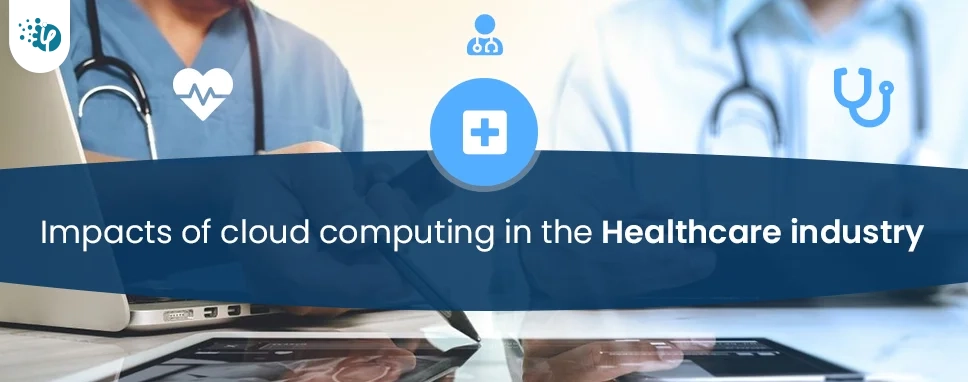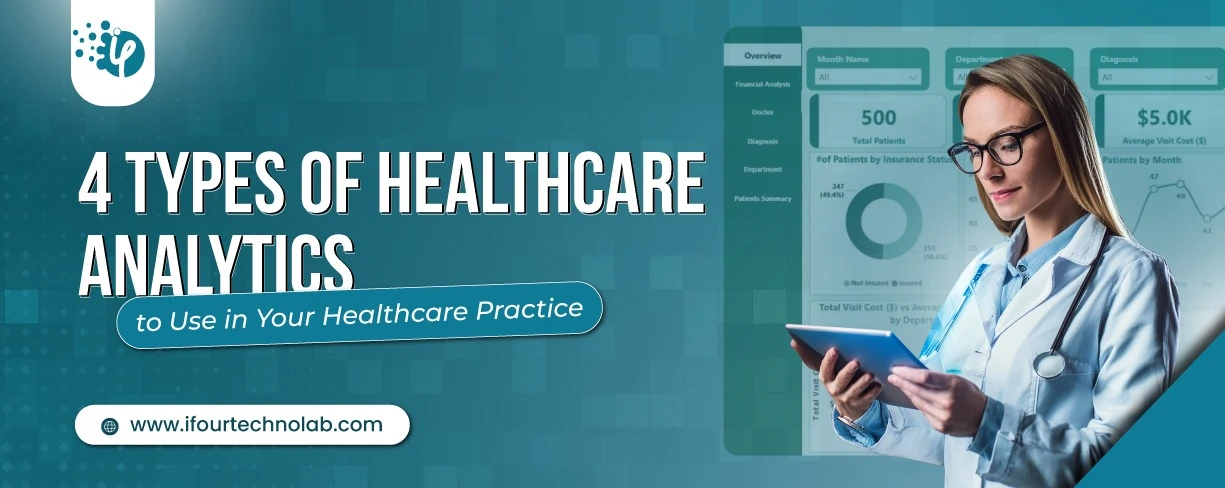4 Types of Healthcare Analytics with Examples & Success Stories
You already know how healthcare creates tons of clinical data every day. Patient visits… Labs… EMRs… doctor portals… scheduling systems… everything is generating numbers nonstop. But...
Listening is fun too.
Straighten your back and cherish with coffee - PLAY !

Healthcare industry is an amazingly fast-growing sector with volumes of data produced every day across its various sections. With the swift increase of data in the sector, data management has become a bigger challenge and needs to scale up with effective solutions. Looking at such ever-evolving needs, cloud computing is the only solution that laser-focuses on seamless data management with enhanced privacy and security.
Cloud computing has brought a phenomenal change impelling various industries for its adoption. The Healthcare sector has witnessed tremendous growth in the recent past with cost-effective cloud solutions and exceptionally offering high-quality healthcare services worldwide.
Cloud computing is an impeccable solution for any industry and has both positives as well as negatives with the factor of data security. In this blog, we will learn and understand how cloud computing impacts the healthcare industry.
“Using the Cloud for data storage would prevent data loss. For many years’ medical records were kept handwritten. Now they are digitalized, but even then, there is no guarantee that the data is safe. The records saved on the computer system can be lost if the hard disk gets damaged. With Cloud, the physical storage dependency would be over, and any chance of data loss would be zero.
If a patient's data is stored on Cloud, it would be very efficient for any doctor to access it. Even if you are away from your usual doctor, Cloud access will make it easy for other doctors to study your illness. Cloud also makes it easy for doctors to collaborate. If a patient is suffering from a disease that requires more than one health specialist, Cloud storage will make it easy for all the doctors to work together.
Cloud can help the researcher in analyzing the data and solve medical mysteries. Cloud can store an enormous amount of data such as patient records, treatment procedures, and much more. Using machine learning, such data could be used for finding a pattern in disease and locate a solution. This would result in more personalized care.
Using Cloud would help the hospitals to cut the cost. Currently, most hospitals are dependent on physical hard drives for storage purposes. Such physical storages are expensive and take up valuable space. With Cloud, you will get the storage at a much lesser cost, and it is also scalable. That means hospitals can increase the storage at their convenience and pay only for that. What more, Cloud Storage would not take any physical space, and there is no requirement of maintenance to keep them safe.”
- Peter Brown, Technical Writer at WindowsChimp
“Cloud computing has altered the backstage settings of many industries. For the healthcare industry, cloud computing has significantly decreased costs. Hospitals will have to purchase the hardware and servers only once and there won’t be any other additional charges.
It even makes the interoperations easier. Sharing and editing data between the departments of a hospital becomes a much easier task for the admins. It can even be shared for gaining multiple expert opinions. Even pharmaceutical companies can access the same.
Having stored the data on the cloud gives access to personalized and better research on various conditions. They give performance analytics to generate more effective treatment plans. It even makes sure that the patients receive the right treatment and medication.”
- Christian Velitchkov, Co-Founder of Twiz LLC
“Cloud Computing will provide significant cost reduction in health care as hospitals will not need to purchase and maintain hardware. Computing power will be available on demand without the need to upgrade further. Cloud computing will also allow for high level data processing such as running algorithms on patient data which will speed up medical research as algorithms are now being used to predict and diagnose diseases through machine learning. Cloud Computing will also boost remote health care facilities such as telemedicine as data will now be remotely available.”
- Osama Jangda, Digital Marketing Executive at PureVPN
“The healthcare industry has been hit hard trying to adapt to the huge amount of changes due to COVID-19. With all of these changes, the healthcare industry is rapidly growing and looking for new ways to improve processes while improving and concentrating on patient care. With the advancement of cloud technology, computerized maintenance management system (CMMS) software allows hospitals to take complete control over all of their maintenance management tasks and operations. CMMS cloud-based software provides healthcare providers with the tools needed to maintain their facilities and keep their equipment running at peak performance. Users can access data remotely through computers and mobile devices while responding to maintenance emergencies, managing inventory, improving collaboration, and sharing data in real-time. CMMS is a centralized system that is built on a subscription-based infrastructure that provides storage, databases, software, and networking. Using this technology to manage maintenance, equipment, and workflows is an easy and affordable application to implement.
Cloud-based computing, CMMS technology, is continually growing at a rapid speed throughout healthcare and all industries. With the increased demands of improving patient care, the demand for efficient and affordable tools increases even more. Having everything in the cloud mitigates the costly risks of equipment breakdowns, reduces operating costs, enhances operational efficiency within the facility, and provides easy-to-access information that is needed for compliance with policies, laws, and regulations.”
- Jeff Roscher, Founder & CEO of eWorkOrders
“The last two months of 2020, compared to the two months previous, saw a 45% increase in hospital ransomware attacks. The shift to the cloud has brought increased convenience and access to data, but it also has exposed healthcare facilities and hospitals to the threats of malware, ransomware, and viruses via the internet. Every cloud application is a potential new entry point for bad actors to access HIPAA data.”
- Jillian Kossman Director of Marketing at DNSFilter.com
It is not necessary that every cloud service provider you adopt would adhere to HIPAA compliance. The risk could severely affect security measures, business protocols including patient privacy, notification procedures, law enforcement, and many more. Therefore, both Cloud service provider and the healthcare sector need to comprehend the tenants and procedures of HIPAA before moving forward. This would benefit both parties with the right cloud solutions.
As the sector has to deal with a massive amount of data every day, a cloud platform would be an indispensable need for sure. Healthcare workers have to be familiar with the cloud processes and come up to speed with the knowledge of working on it. If not, could lead to many problems such as improper data management, data handling risks, downtime, and data breach. Thus, it is an imperative move to train healthcare professionals excellently and keep them updated.
Cloud computing has been phenomenal in managing digital records of healthcare sectors with fine security. The tremendous support for ginormous EHR datasets and on-demand access to resources made it out of the crowd. Improved analysis and data tracking, better-personalized care, quicker responses, reduced risks, etc. are some other factors that made its success. In this blog, we have gone through various ways of how cloud computing impacts the healthcare industry.

You already know how healthcare creates tons of clinical data every day. Patient visits… Labs… EMRs… doctor portals… scheduling systems… everything is generating numbers nonstop. But...

Let’s keep it simple. In healthcare, trust, safety, and human dignity come first, no matter what solution you build. The same applies to AI. Today, it is everywhere, from clinics...

Let's keep it real. The whole point of building autonomous Agents is to cut manual work and keep focus on business. Approvals that used to take days can happen in hours because...